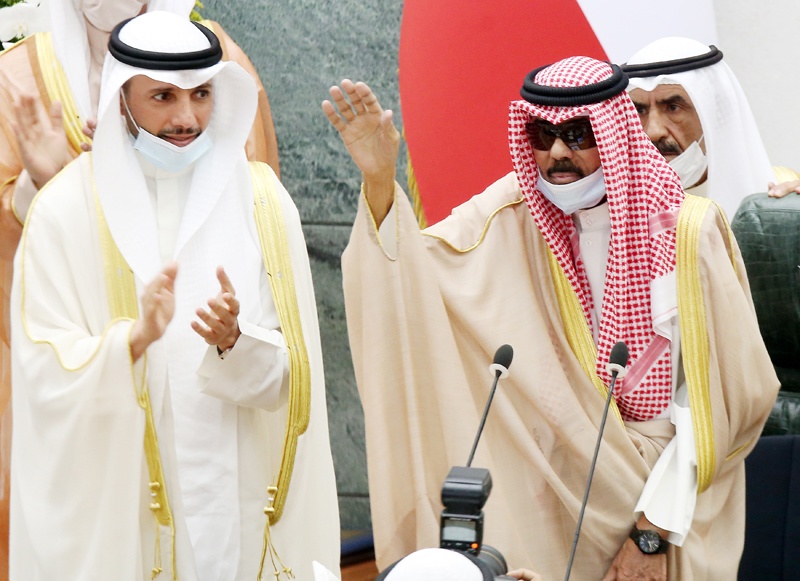 KUWAIT: HH the Amir Sheikh Nawaf Al-Ahmad Al-Jaber Al-Sabah and National Assembly Speaker Marzouq Al-Ghanem attend the opening of the second session of the 16th legislative term yesterday. - Photo by Yasser Al-Zayyat
KUWAIT: HH the Amir Sheikh Nawaf Al-Ahmad Al-Jaber Al-Sabah and National Assembly Speaker Marzouq Al-Ghanem attend the opening of the second session of the 16th legislative term yesterday. - Photo by Yasser Al-ZayyatBy B Izzak
KUWAIT: HH the Amir Sheikh Nawaf Al-Ahmad Al-Jaber Al-Sabah yesterday opened the new term of the National Assembly amid optimism resulting from the outcome of the national dialogue to resolve political disputes. Unlike the previous term, the opening session passed off peacefully with no heated arguments or exchanges of strong words. A majority of permanent and temporary committees were also elected by a unanimous vote with no contests, contrary to the previous term where panel elections saw stiff competition.
In his opening remarks to the parliament, HH the Amir reiterated the importance of efforts to reinforce reforms to benefit the people through cooperation between the legislative and executive authorities. Delivering the Amiri address on behalf of HH the Amir, HH the Prime Minister Sheikh Sabah Al-Khaled Al-Hamad Al-Sabah said HH Sheikh Nawaf stressed the importance of serving the people through parliamentary and government cooperation to overcome obstacles and bolster development.
In his speech, Speaker Marzouq Al-Ghanem thanked HH the Amir for calling for the national dialogue and invoking his constitutional authority to issue an amnesty for some opposition politicians. He also thanked the prime minister and MPs for positively responding to HH the Amir's call and taking part in the national dialogue. The speaker specifically thanked opposition MP Obaid Al-Wasmi, who was one of three opposition lawmakers who took part in the dialogue.
Ghanem acknowledged that "we all committed mistakes" and expressed hope that the national dialogue will lead to more breakthroughs that will make the Kuwaiti people very glad. "Dialogue, agreement and roundtable policy ... are the best ways to resolve all our problems," Ghanem said. He however insisted that "if we want to turn a new page, we must hold firm to our constitutional principles". The speaker also emphasized that achieving political stability does not mean dropping accountability like some said. "We should use constitutional tools in a prudent way".
HH the Prime Minister Sheikh Sabah said the national dialogue was launched to achieve more political stability, adding the dialogue has resulted in an agreement to extend hands of cooperation. He said the government aims at reforming the economy and diversifying sources of income, but without undermining the interests of low-income people. The prime minister stressed on his government's resolve to continue to fight corruption.
During the session, the Assembly refused to form four temporary panels, including one for dealing with the affairs of stateless people or bedoons, after some MPs insisted that such issues should be tackled by the interior and defense committee. The Assembly also refused to form a temporary committee for oil affairs, with some MPs saying such an important sector must be debated by the financial and economic affairs committee.
The Assembly also unanimously elected opposition MPs Farz Al-Mutairi and Osama Al-Shaheen as secretary and observer of the Assembly respectively. Ghanem then adjourned the session until Nov 9. Before then, it is highly expected that HH the Amir will pardon a number of opposition activists, including former MPs exiled in Turkey for over three years, as part of the national dialogue. It is also highly expected that the government will resign to pave the way for forming a new Cabinet, taking into account the outcome of the national dialogue.
During the session, there was a protest by opposition MP Hamdan Al-Azemi over why the speaker had deleted a number of grillings against the prime minister and several Cabinet ministers. Ghanem said he took the responsibility, along with the Assembly office, to delay the grillings until the next session, hoping that something good will happen as a result of the national dialogue.
Opposition MP Saifi Al-Saifi had called for delaying the election of committees because the government is reportedly planning to resign, and accordingly the election of panels should be held in the presence of the new Cabinet. The speaker however said the elections should not be linked to the future of the Cabinet.










